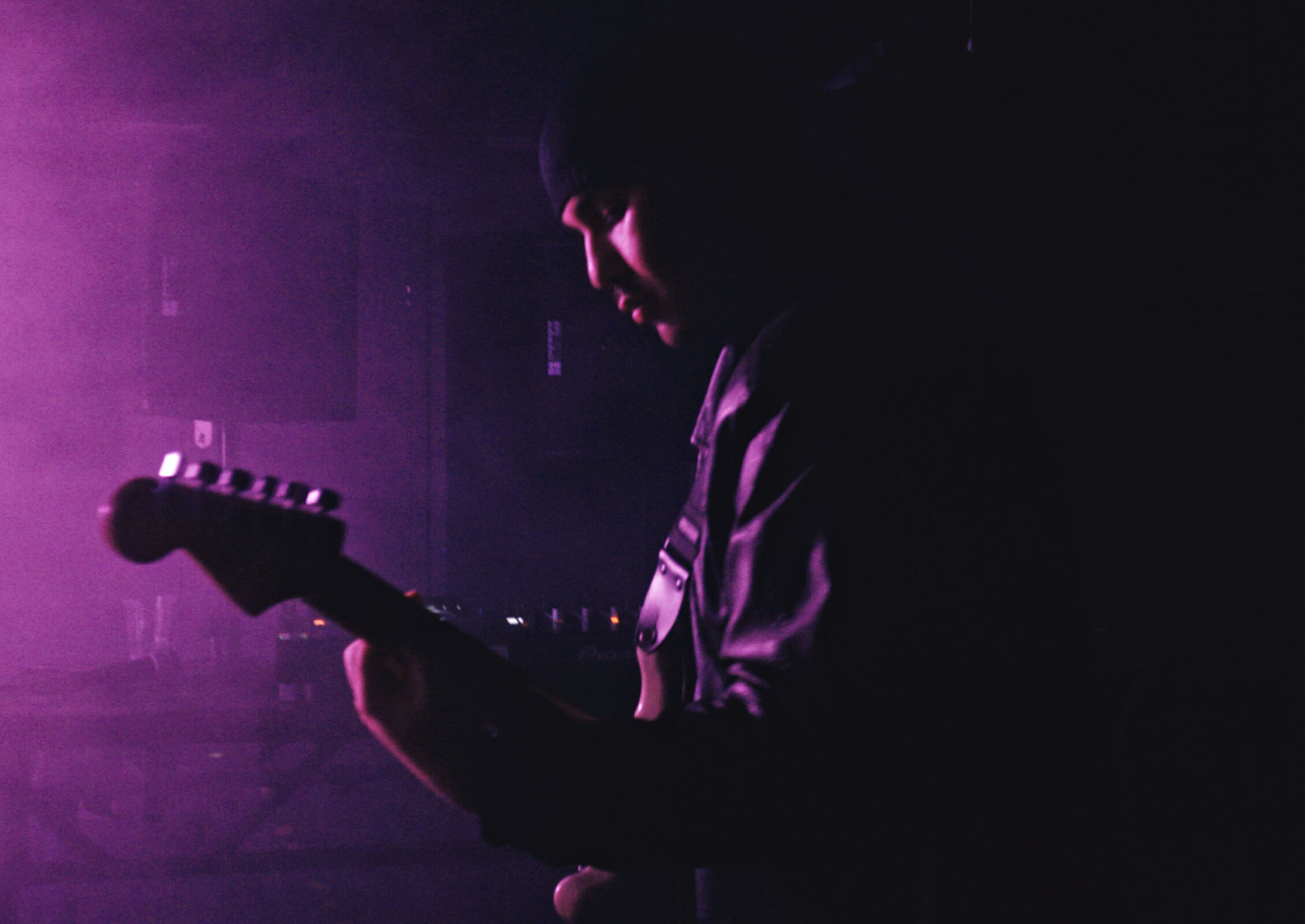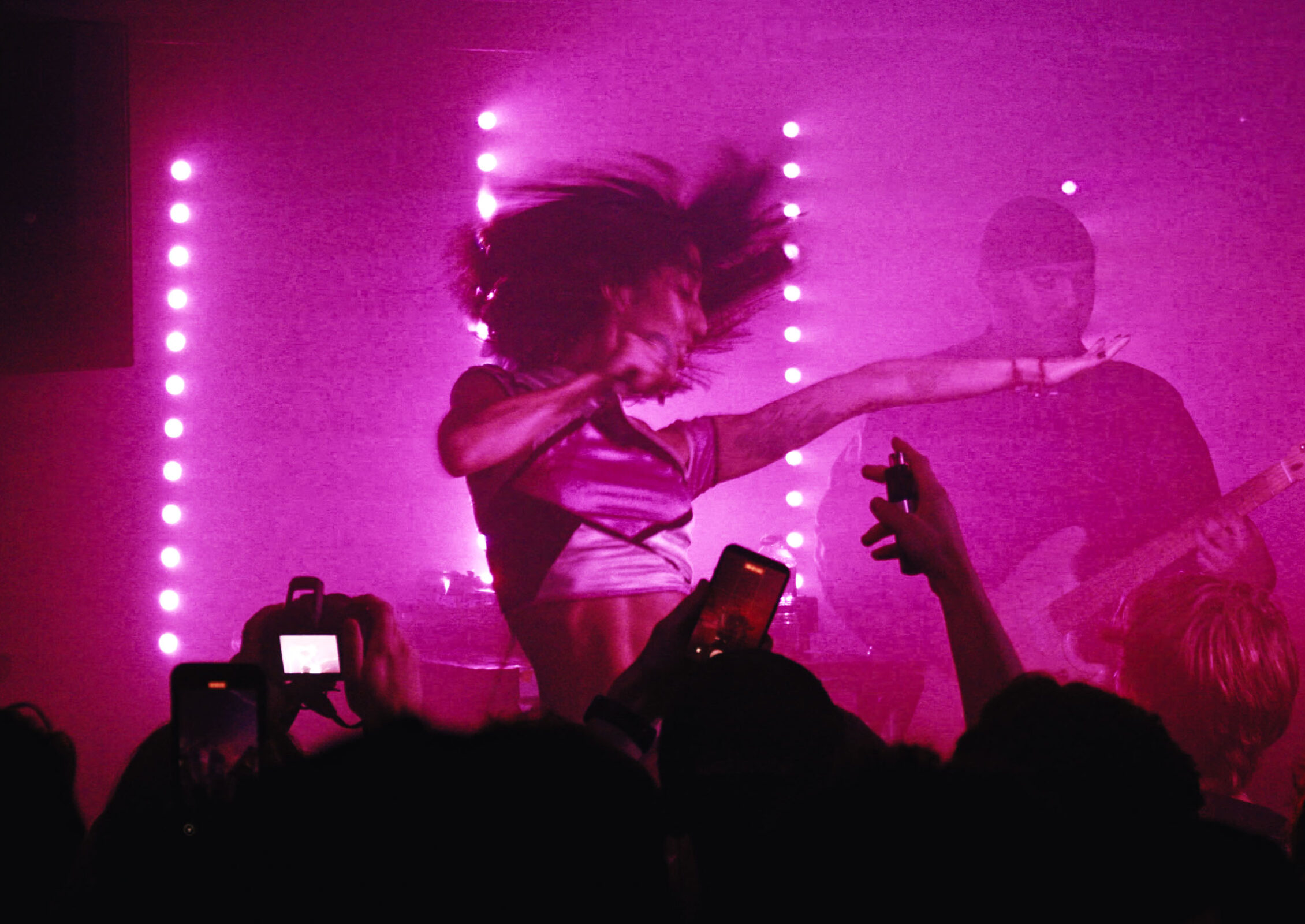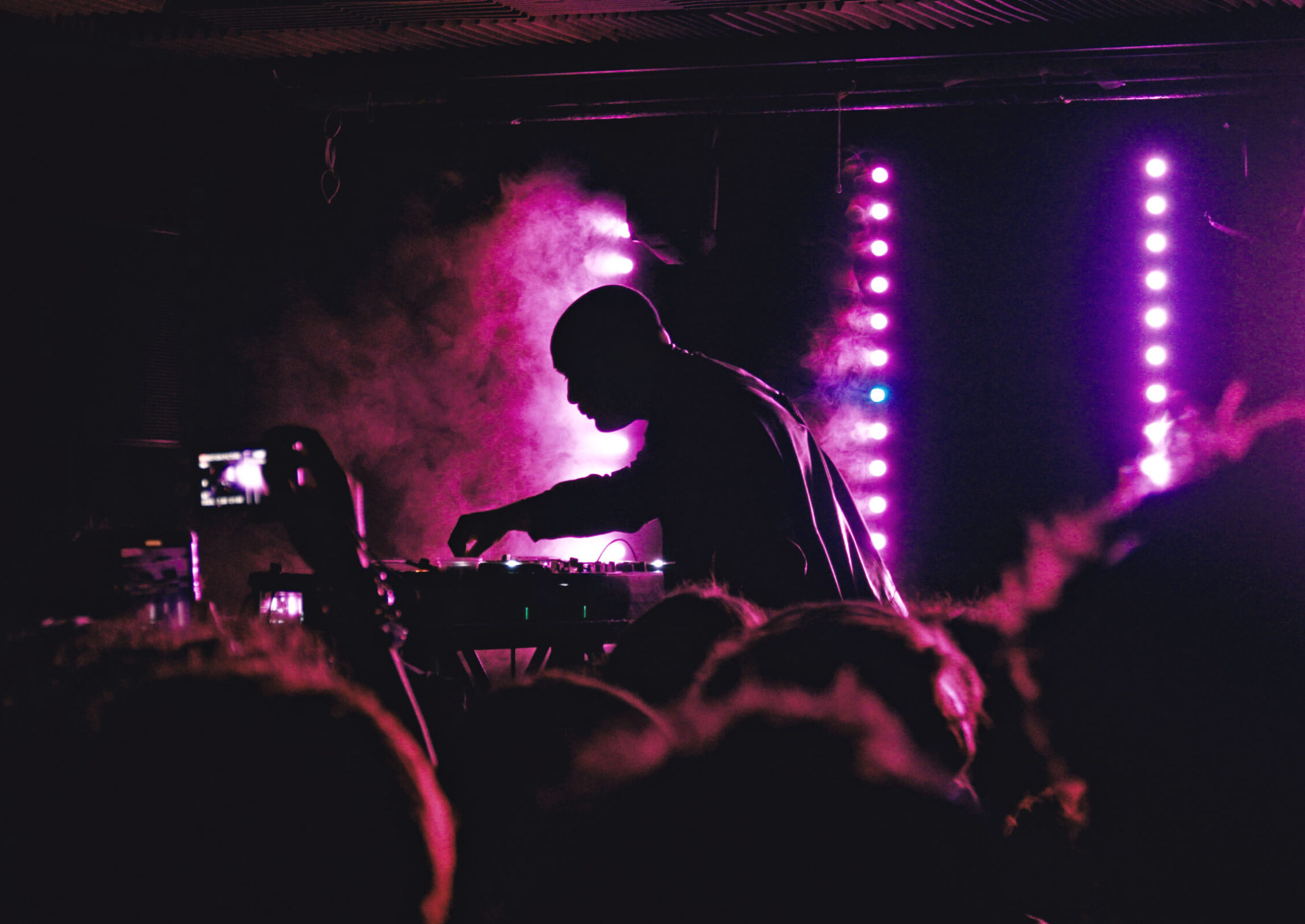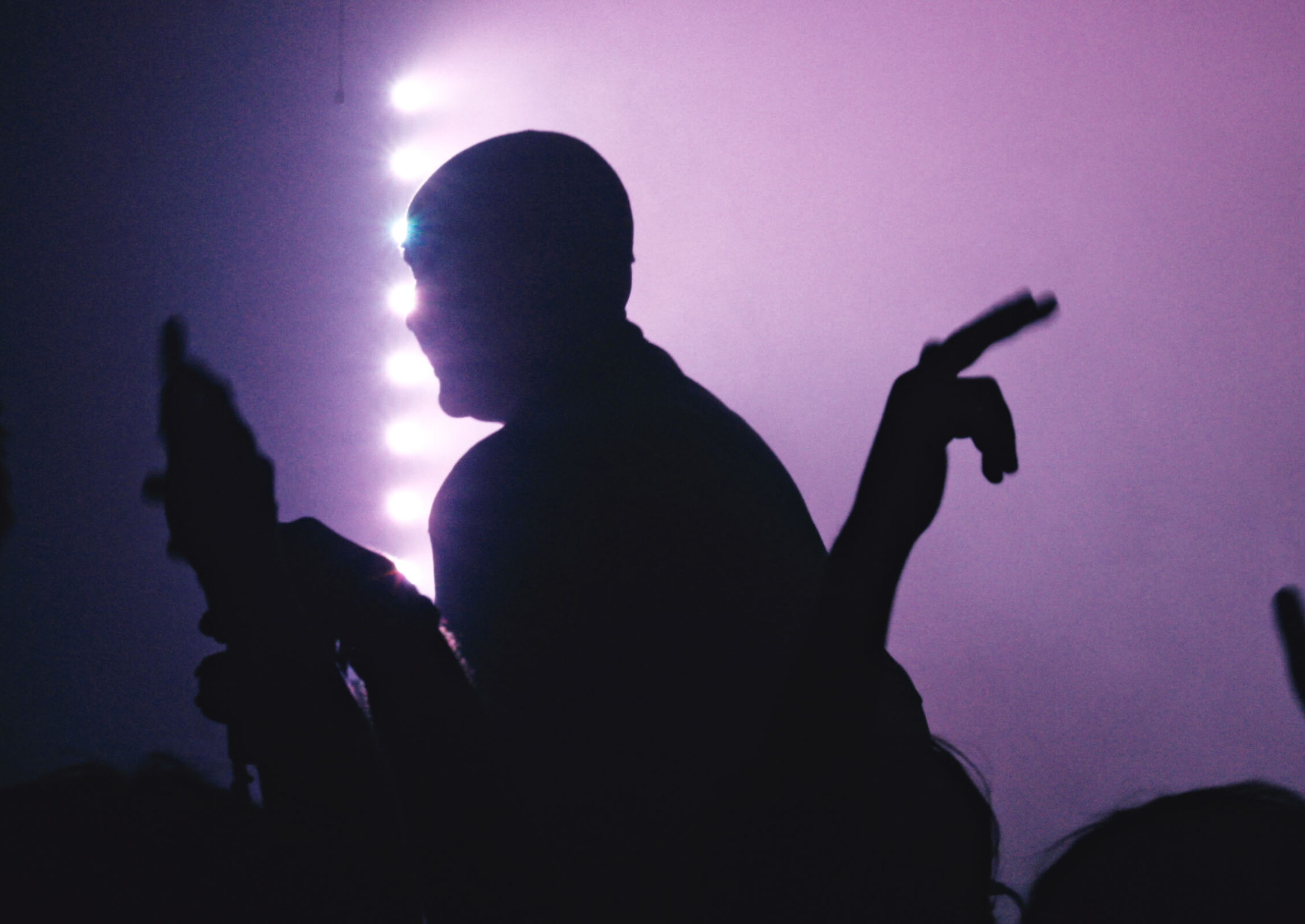- Words Liam Cattermole
Münich-born, London-based producer and artist Mechatok talks his tips for navigating the online world, being addicted to K-Pop videos and how he hopes his debut album, Wide Awake, can propose a new vision for pop music.
It’s the middle of summer, and 300 trendy twenty to thirty-somethings are crammed in the basement of Peckham Audio waiting for the arrival of Mechatok. Born in Münich, and since making waves in London and Berlin, the artist and producer emerges from the smoke – a mixture of fruity vape, human sweat and fog machine – and slacks his guitar around his waist. He draws an isolated figure on stage, with nothing more than a pair of DJ decks and a laptop to aid the show. Fans have gathered to hear music from his debut album, Wide Awake, before its release in two weeks. A sugar rush of breathless electronica and blissful ambience, the collection of digital earworms, he tells me a few days prior, is his answer to a pop record: “Originally, my music was quite purist and minimalist. This time, I wanted to make my imaginary version of a pop project, even if most people wouldn’t consider it so.”
Wide Awake certainly doesn’t consign to pop classicism; you’d struggle to see where a Sabrina Carpenter fits within the fragments of dystopian EDM, wobbling dubstep and euphoric techno. However, under the Mechatok moniker, (real name) Emir Timur Tokdemir has architected a version of the genre that’s resonated widely: Charli xcx, Drain Gang (Bladee, Ecco2k, Thaiboy Digital and Whitearmor), Oklou and Fakemink are all credited as recent(ish) collaborators.
 Screenshot
Screenshot
The album sounds like an endless doomscroll, which appears intentional as Mechatok blurs the lines between virtual reality and escapism. Voice notes are chopped around algorithmic melodies and emotional beats to create the buzz of a social media feed and the dopamine hit of a YouTube wormhole. There are moments where anxiety creeps in, “It’s like you don’t exist,” says a softly spoken voice on the album opener whilst the lyrics on ‘Don’t Say No’ are damning: “I can see your friends, they don’t like me”. Despite the lyrical hardship, the songs are conventionally uplifting.
This feeling was on full display at Mechatok’s intimate gig last month, where his loyal cohort erupted rapturously in response to singles like ‘Expressions On Your Face’ with Drain Gang alumni Bladee and Ecco2k, as well as a guest appearance from the always elegant Isabella Lovestory, who features on the contagious ‘She’s A Director’. Weirdly enough, although Wide Awake navigates a hyper-online universe, there’s barely a phone in sight at Peckham Audio. Mechatok’s music has mastered a carefreeness that makes you throw your arms in the air instead of reaching for your pocket, which, given the pressures of algorithmic fluency and the sinkhole of gloom that often appears in them, feels more important now than ever.
Here, Mechatok talks his tips for navigating the online world, being addicted to K-Pop videos and how he hopes Wide Awake’s unconventional take on pop music can become an instant classic.
 Screenshot
Screenshot
How did this debut album come to be and why did you feel it was a good time to step out of the shadows and into the role of a fully-fledged artist?
I slid into the world of collaboration and producing for other people during COVID, especially after I released the album with Bladee [Good Luck]. After the pandemic, playing out seemed like such a fun thing to do. I wanted to focus on that and running my party, Natural Mind, as well as doing my Master’s in Design. It felt like a research phase for a few years, coming up with ideas and architecting a new proposal in sound.
How has the design degree fed into the music you make?
I think about music quite visually; I usually have an image in my head for how I want the music to sound. I had a clear visual direction for this album before I started speaking with people about it.
Your bio alludes to Mechatok being a fictionalisation that allows you to explore different facets of yourself. On Wide Awake, where have you reached from that you hadn’t previously?
I often speak about my music being “pop music”, even if people wouldn’t consider it so. The avatar lives in that space. It’s not like Gorillaz or Daft Punk where I’m hiding my identity. It’s more that, if it’s not tied to yourself, then you can be more creative and imaginative. Originally, my music was quite purist and minimal. This time, I really wanted to make my imaginary version of a pop album. I had to think about this character and the troubles he goes through.
The character experiences moments of technology-induced anxiety on the album. What’s your own personal relationship like with algorithms and the illusion of hyperrealism this often creates?
That definitely informed the album, more from a practical sense, as it’s what I’ve been experiencing recently: non-stop scrolling on my phone, binge-watching shit on YouTube, and then the next week finding myself in loads of different cities. There’s this crazy contrast between an isolated, purely online experience and then the turbo physical. I feel that there are similarities between the two, as you dissociate and experience places at such a high frequency that you aren’t really aware of reality. The memories I would have, I was almost unsure whether I’d seen them online or whether they were real. I wanted to find a way of expressing that musically and find beauty in this.
 Screenshot
Screenshot
I find the structure of the lyrics really interesting, how they’re collaged and chopped up instead of in traditional verse formats. What were you looking to portray with this?
A lot of the treatment of vocals is related to the way it is when you’re on a social media feed, hearing so many different sounds all at once. There are also some awkward and radical silences on the record, which is kinda like when your wifi’s shit and the video’s lagging, if you know what I mean. All the songs on this record could turn into mainstream or accessible music. I choose to make it sound weird, but I hope that over the years, people remember the melodies and more pop elements, too.
What’s your favourite thing to binge-watch at the moment?
I’m not gonna lie, I haven’t been doomscrolling recently because I’ve had to work a lot. I watch a lot of K-Pop music videos; that shit is like drugs to me. The amount of colours, information… It’s manufactured to suck you in. There’s a degree of influence that music had on this record; I’m fascinated by how overwhelming it is.
My favourite song is ‘Everything’. I love the contrast between the wobbly dubstep and more ethereal moments. How did that one come about?
I have this backlog of recordings of people I’ve worked with. For ‘Everything’, I started chopping up voice notes from Isabella Lovestory and Toxe, who I used to be in Emiranda with, over a bass line. I tried to create some poetry out of that, a poem about everything happening at the same time. I wanted to contrast that with an instrumental that’s quite chill and ambient. It was to represent everything happening on your screen, but at the same time, you’re actually just in a room where nothing is happening at all.
What are your tips for withdrawing yourself from the internet when you know it’s getting a bit much?
As a kid, I really enjoyed being online all the time; it helped me escape. But over the years, I’ve started enjoying physical interaction around music more. For me, it’s about swapping out habits in your life that force you to look at things like your phone. To get to the studio, I have to cross London Bridge, and I have that postcard moment where I’m looking out over the skyline on the bike, and that’s when your thoughts become a lot lighter and you realise how small you are compared to the context of the real world. That’s what keeps me from being terminally online.
 Screenshot
Screenshot
Obviously, ‘Expressions on your face’ is a massive tune. How did you originally hook up with the Drain Gang crew?
There’s a collective in London called Bala Club, who were mates with Drain Gang very early on, like 2014. There was this triangle between Berlin, London and Stockholm, and we just became friends really. We played the same parties and mixed in the same circles. Over the years, everyone has established themselves in their own lanes. We kept crossing paths. Bladee moved to Berlin just before COVID, and when COVID hit, we had nothing else to do other than hang out, watch obscure things on YouTube and make music. Then we made the album GOOD LUCK, and we’ve consistently had songs on each other’s records since.
‘MAKKA’ is another song you’ve been involved in recently that everyone is raving about. How did that one come about with fakemink?
It wasn’t an intentional link-up exactly. He was in a different studio room, doing his thing and then he came in to say hi. That song was meant to be an indie-type track. I had written it a few months before in New York. I came to London and played it out. He was into the beat immediately and then recorded the verse basically in one take.
When did you realise that what you were making, which was inherently underground, was starting to have mainstream appeal?
A big aspect was the live element. When people started singing along to the melodies instead of just being there in the audience, nodding their heads at the back of the club, I was like, ‘Oh, I guess there are fans who are actually into this.’ It’s funny with the online shit, because you can have millions of views, but they can also be someone that you wouldn’t even recognise if they played live. It’s always hard to gauge through numbers whether something is resonating or not, but when I started playing live, I could tell that it was becoming more than just this complete nerdism.
What do you think sets Natural Mind apart from other club nights? Where would you like to take it that you haven’t before?
I want to take it to other cities. I didn’t even live in London when I started it, but it’s where I had the biggest audience. The music culture in London is amazing. There’s so much politics in nightlife, and in Berlin, clubs operate super differently than in London. There’s more of an elitist mentality. At Natural Mind, people can take photos and come behind the decks. I’m curious to experiment with what Natural Mind could look like in other nightlife scenes.
What does a Mechatok show look like?
I arrange and flip the tracks with my laptop and play a lot of guitar live, which is super fun. It’s like my version of rapping. I run the guitar through my laptop, so it sounds like synths. Have you heard of Bucket Head? It was the hardest song on Guitar Hero, but if you look up his live shows, he plays the guitar over these really tacky beats but does these insane things with the guitar. That’s one of the main references for my live sets. It’s been cool to not hide behind the decks and actually become a performer.
What legacy do you want Wide Awake to leave?
At whatever level, I’d like for it to become a bit of a classic. That’s what I want to do with this album, that’s why I took my time to make it. I want it to be this insular thing that stands on its own and lives on in people’s lives as something they keep coming back to, rather than stream loads for two weeks and get bored with.

